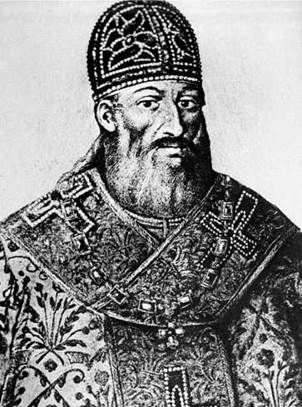Moghila, Peter (1596–1646)
KONSTANTIN GAVRILKIN
One of the highly significant figures in the post-Byzantine history of Eastern Orthodoxy, Peter Moghila was raised and educated in the Polish-Lithuanian Commonwealth in the decades after practically all Orthodox bishops in the region submitted to the Union with Rome in 1596 (Dmitriev et al. 1996). He first studied at the school of the L’vov Orthodox Brotherhood, which defended Orthodoxy with a group of similar brotherhoods under the leadership of a few Orthodox magnates. He then went to the Polish Academy in Zamosc with its university curriculum, and later continued his education in France and Holland. After a short secular career, he dedicated his life to the Orthodox Church. An important role in his formation was played by Iov Boretskii, his former teacher in L’vov, who in 1620–31 served as metropolitan of Kiev and exarch of Constantinople under the ecumenical patriarchate.

Plate 41 St. Peter Moghila. RIA Novosti/ Topfoto.
Moghila joined the Kiev Caves Lavra in 1625 and by 1627 became its abbot. In 1632 he founded the Collegium in Kiev, later known as the Kiev-Moghila Academy, with the curriculum based on the Jesuit model and Latin as primary language of the eleven-year-long course of study. Moghila believed that the Orthodox Church in Galicia, with its poorly educated clergy and mostly peasant membership, could survive and succeed only through integrating into Polish culture and modeling its education after European universities. The school would remain the leading center of Orthodox higher education in Europe until the early 19th century; many of its graduates later moved to Russia and became the core of its intellectual elite, both secular and ecclesiastic.
In 1632 Moghila was able to secure the legalisation of the Orthodox Church, outlawed by the Polish state since 1596. In 1633 he was installed as metropolitan of Kiev and Galicia under the jurisdiction of Constantinople. Active in restoring the order and wellbeing of many Orthodox churches and monasteries, editing and printing various liturgical and theological books, and developing theological education, Peter Moghila also wrote the famous Orthodox Confession (1640), later translated into several languages, which was adopted by contemporary Orthodox churches as a standard introduction to the Orthodox faith. He and his followers have been accused sometimes of bringing the Orthodox Church into the “western captivity” by adopting the Roman Catholic standards of theological polemic and education (such was Florovsky’s opinion). Today, however, many recognize him as the outstanding leader and defender of the Orthodox Church of his day, and, as such, he was canonized by the Romanian, Polish, and Ukrainian Orthodox Churches.
SEE ALSO: Iasi (Jassy), Synod of (1642)
REFERENCES AND SUGGESTED READINGS
Charipova, L. V. (2006) Latin Books and the Eastern Orthodox Clerical Elite in Kiev, 1632–1780. Manchester: Manchester University Press.
Dmitriev, M. N., Floria, V. N., and Iakovenko, S. G. (1996) Brestskaia uniia 1596 g. i obshchestvenno- politicheskaia bor’ba na Ukraine i v Belorussii v kontse XVI-nachale XVII v. Moscow: Indrik.
Golubev, S. (1883–98) Kievskii mitropolit Petr Mogila i ego spodvizhniki (Opyt tserkovno- istoricheskogo issledovaniiia), 2 vols. Kiev: G. T. Korchak-Novitskogo (vol. 1); S. V. Kul’zhenko (vol. 2).
Popivchak, R. P. (1975) Peter Mohila, Metropolitan of Kiev (1633–47): Translation and Evaluation of his “Orthodox Confession Of Faith” (1640). Washington, DC: Catholic University of America.
Pritsak, O. and Sevcenko, I. (eds.) (1985) “The Kiev Mohyla Academy (Commemorating the 350th Anniversary of Its Founding, 1632–1982),” Harvard Ukrainian Studies 8, 1/2.
